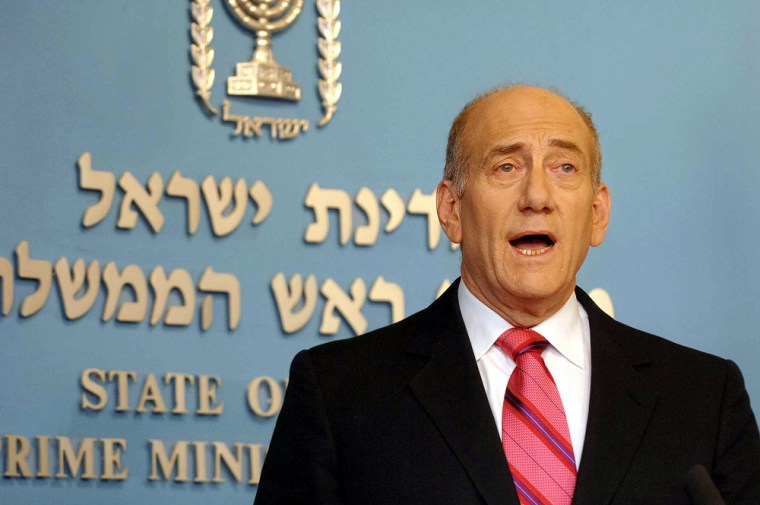Prime Minister Ehud Olmert told Israelis on Monday that he has been diagnosed with prostate cancer, but said the disease was not life-threatening and will not disrupt his work as the country’s leader.
The disclosure came at a sensitive time in Mideast diplomacy, with Olmert and another one-time prostate cancer patient — Palestinian President Mahmoud Abbas — struggling to bridge gaping differences ahead of a U.S.-brokered peace conference.
Speaking calmly before a packed hall of reporters, Olmert said the disease was caught early and that he would have surgery “over the next few months.” Vice Premier Haim Ramon said the surgery would be done after the conference.
“I will be able to carry out my duties fully before the treatment and within hours afterward,” Olmert said. “My doctors ... informed me that there is a full chance of recovery and there is nothing about the tumor that is life-threatening or liable to impair my performance or my ability to carry out the mission which has been bestowed upon me.”
“It is a matter of a microscopic growth, it hasn’t spread and can be removed by a short surgical procedure. According to the medical opinion, there will be no need for radiation treatment or chemotherapy,” Olmert said.
Israeli leaders traditionally kept information on their private lives and health from the public, but that changed abruptly when Olmert’s predecessor, Ariel Sharon, suffered a stroke that left him comatose in January 2006. Many Israelis felt they should have been better informed about their leader’s ill health and that concern clearly contributed to Olmert’s swift and detailed announcement of his diagnosis.
The 62-year-old Olmert spoke for about three minutes before leaving the room and turning the podium over to his doctors.
U.S.: 'We wish him very well'
The news came just ahead of a U.S.-brokered summit designed to relaunch long-stalled peace talks. It was not clear how or if Olmert’s illness would affect his troubled efforts to frame a common outline with the Palestinians before the conference, scheduled to take place in Annapolis, Md., in November or December.
White House spokeswoman Dana Perino said Olmert’s illness was not likely to delay the conference. “We wish him very well,” she said.
Secretary of State Condoleezza Rice called Olmert “to wish him a speedy recovery,” State Department spokesman Sean McCormack said. He said he did not expect Olmert’s illness to affect Rice’s plans to visit Israel and the Palestinian territories beginning this weekend.
Benita Ferrero-Waldner, the European Union’s commissioner for external relations, said: “I’ve seen Prime Minister Olmert in the morning. I must say he was serene, he was joking, he was open and he was very much in control of himself,” she said. “Personally I don’t think that this will jeopardize the talks.”
'Nothing that showed fear'
One of Olmert’s doctors, Shlomo Segev, said the prime minister had a biopsy Oct. 19 and received the results Friday. He said the cancer showed up in only one of 12 samples taken from Olmert’s prostate.
When Olmert was informed of the results, “There was nothing that showed fear,” Segev said.
Another of his doctors, Yaacov Ramon, said treatment could wait several months without any risk, and that surgery should eliminate the cancer. The chances of full recovery are 95 percent, he said.
He said men who have the surgery are usually hospitalized for three days, followed by a recuperation period at home during which they can work. Foreign Minister Tzipi Livni was expected to take over if Olmert is incapacitated.
Doctors to remove prostate gland
The prostate is a walnut-shaped gland beneath the base of the penis that makes seminal fluid.
Ramon said doctors planned to remove Olmert’s prostate gland. Treatment often leads to problems having sex or controlling the bladder, so finding a way to distinguish which tumors can safely be left alone is the field’s top priority.
According to Cancer Research UK, more than 670,000 men worldwide are diagnosed with prostate cancer every year, making it the second most common cancer in men after lung cancer. It is found mainly in men over age 55, and the average age of diagnosis is 70, according to the European Society for Medical Oncology.
Olmert, who first entered parliament in 1973, was catapulted into the prime minister’s seat after Sharon’s 2006 stroke.
Considered a back-room operator with considerable political talent but little charisma, Olmert nonetheless led the new Kadima Party formed by Sharon to victory in parliamentary elections two months later. Sharon remains unconscious and is hospitalized in a long-term care facility.
Difficult tenure
Though pilloried for mishandling Israel’s war against Hezbollah guerrillas in Lebanon that summer, Olmert has managed to keep his coalition government together despite dismal approval ratings.
In recent months, he has been meeting regularly with Abbas in an effort to draft a joint statement on peace ahead of the Annapolis conference. Abbas had surgery for prostate cancer in 2001.
Palestinian negotiator Saeb Erekat sent his best wishes to the Israeli leader.
“We wish him a speedy recovery, and we hope to continue working with him toward achieving a two-state solution and ending the Israeli occupation that began in 1967,” Erekat said.
Several high-profile U.S. politicians have disclosed their battles with cancer in recent years, including three current U.S. presidential candidates.
Former New York City Mayor Rudy Giuliani was sidelined politically in 2000 after he was diagnosed with prostate cancer, only to re-enter the fray ahead of next year’s presidential race. Former “Law & Order” star Fred Thompson was diagnosed with non-Hodgkin’s lymphoma and Republican Sen. John McCain has had three bouts with melanoma, the most aggressive form of skin cancer.
Elizabeth Edwards, wife of presidential candidate John Edwards, announced her breast cancer had returned, and White House spokesman Tony Snow recently had surgery for cancer that spread to his liver.
